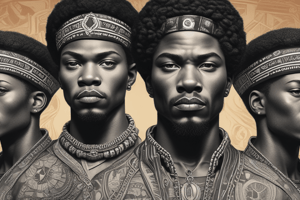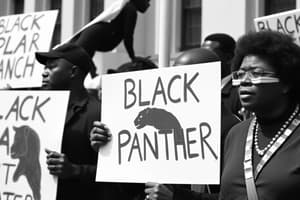Podcast
Questions and Answers
What was the primary goal of the Montgomery Bus Boycott?
What was the primary goal of the Montgomery Bus Boycott?
- Ending racial segregation on the public transit system (correct)
- Desegregating the education system in Alabama
- Gaining voting rights for African Americans in the South
- Improving economic opportunities for African Americans in Montgomery
Which of the following cultural movements is most closely associated with the 1960s and 1970s?
Which of the following cultural movements is most closely associated with the 1960s and 1970s?
- The New Negro Movement
- Hip-Hop
- The Black Arts Movement (correct)
- Afrofuturism
Who delivered the historic 'I Have a Dream' speech during the March on Washington for Jobs and Freedom?
Who delivered the historic 'I Have a Dream' speech during the March on Washington for Jobs and Freedom?
- Rosa Parks
- Frederick Douglass
- Malcolm X
- Martin Luther King Jr. (correct)
What is the primary focus of the Afrofuturism genre?
What is the primary focus of the Afrofuturism genre?
What was the outcome of the Civil Rights Movement's efforts in the 1960s?
What was the outcome of the Civil Rights Movement's efforts in the 1960s?
Study Notes
Black History: Notable Figures, Cultural Heritage, and the Civil Rights Movement
Notable Black Figures
Black history is rich with influential figures who have shaped the world through their contributions in various fields. Some of the most notable include:
Martin Luther King Jr.
Martin Luther King Jr. (1929-1968) was a civil rights activist who played a key role in the American civil rights movement from the mid-1950s until his assassination in 1968.
Malcolm X
Malcolm X (1925-1965) was an African-American Muslim minister and human rights activist who was a prominent spokesperson for the Nation of Islam from 1952 until 1964, and for Sunni Islam after 1964 until his assassination.
Harriet Tubman
Harriet Tubman (1822-1913) was an American abolitionist and political activist born into slavery but who escaped and subsequently made some 13 missions to rescue approximately 70 enslaved people using the network of antislavery activists and safe houses known as the Underground Railroad.
Frederick Douglass
Frederick Douglass (1818-1895) was an American social reformer, orator, writer, and statesman. After his escape from slavery, he became a leader of the abolitionist movement, gaining note for his daring acts of escaped and his powerful oratory.
Rosa Parks
Rosa Parks (1913-2005) was an American civil rights activist whom the U.S. Congress called "the mother of the civil rights movement".
Black Cultural Heritage
Black cultural heritage encompasses a wide range of artistic and cultural movements. Some of these include:
The New Negro Movement
The New Negro Movement, also known as the Harlem Renaissance, was a cultural, social, and artistic movement that took place in the 1920s, centered in the Harlem neighborhood of New York City.
The Black Arts Movement
The Black Arts Movement was an artistic and literary movement that originated in the United States in the mid-1960s and lasted until the mid-1970s.
Hip-Hop
Hip-hop is a culture and artistic movement that originated in New York City during the late 1970s.
Afrofuturism
Afrofuturism is a genre of science fiction that explores the intersection of African diasporic cultures and futuristic themes.
Civil Rights Movement
The civil rights movement, also known as the African-American civil rights movement, was a social movement in the United States that took place between 1865 and 1980, with the goal of securing equal rights for African Americans. The movement was characterized by a series of protests, sit-ins, marches, and other forms of civil disobedience. Some of the key events and milestones in the civil rights movement include:
The Montgomery Bus Boycott
The Montgomery Bus Boycott was a political and social protest campaign against the policy of racial segregation on the public transit system of Montgomery, Alabama.
The March on Washington for Jobs and Freedom
The March on Washington for Jobs and Freedom, also known as the March on Washington, was held on August 28, 1963, in Washington, D.C., where Martin Luther King Jr. delivered his historic "I Have a Dream" speech.
The Voting Rights Act of 1965
The Voting Rights Act of 1965, also known as the Voting Rights Act, is a landmark civil rights and voting rights law in the United States that prohibits racial discrimination in voting.
In conclusion, black history is a rich and complex tapestry that encompasses a wide range of notable figures, cultural heritage, and historical movements. Understanding and appreciating this history is essential for promoting equality and social justice.
Studying That Suits You
Use AI to generate personalized quizzes and flashcards to suit your learning preferences.
Description
Delve into the rich history of African Americans, from influential figures like Martin Luther King Jr. and Rosa Parks to cultural movements like the Harlem Renaissance and Afrofuturism, and the significant events of the Civil Rights Movement. This quiz will test your knowledge of the key people, events, and cultural movements that shaped the African American experience.




